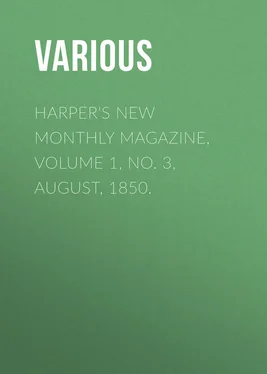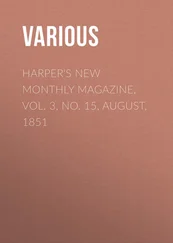Various - Harper's New Monthly Magazine, Volume 1, No. 3, August, 1850.
Здесь есть возможность читать онлайн «Various - Harper's New Monthly Magazine, Volume 1, No. 3, August, 1850.» — ознакомительный отрывок электронной книги совершенно бесплатно, а после прочтения отрывка купить полную версию. В некоторых случаях можно слушать аудио, скачать через торрент в формате fb2 и присутствует краткое содержание. Издательство: Иностранный паблик, Жанр: periodic, foreign_edu, на английском языке. Описание произведения, (предисловие) а так же отзывы посетителей доступны на портале библиотеки ЛибКат.
- Название:Harper's New Monthly Magazine, Volume 1, No. 3, August, 1850.
- Автор:
- Издательство:Иностранный паблик
- Жанр:
- Год:неизвестен
- ISBN:нет данных
- Рейтинг книги:5 / 5. Голосов: 1
-
Избранное:Добавить в избранное
- Отзывы:
-
Ваша оценка:
- 100
- 1
- 2
- 3
- 4
- 5
Harper's New Monthly Magazine, Volume 1, No. 3, August, 1850.: краткое содержание, описание и аннотация
Предлагаем к чтению аннотацию, описание, краткое содержание или предисловие (зависит от того, что написал сам автор книги «Harper's New Monthly Magazine, Volume 1, No. 3, August, 1850.»). Если вы не нашли необходимую информацию о книге — напишите в комментариях, мы постараемся отыскать её.
Harper's New Monthly Magazine, Volume 1, No. 3, August, 1850. — читать онлайн ознакомительный отрывок
Ниже представлен текст книги, разбитый по страницам. Система сохранения места последней прочитанной страницы, позволяет с удобством читать онлайн бесплатно книгу «Harper's New Monthly Magazine, Volume 1, No. 3, August, 1850.», без необходимости каждый раз заново искать на чём Вы остановились. Поставьте закладку, и сможете в любой момент перейти на страницу, на которой закончили чтение.
Интервал:
Закладка:
A line of ancient trees runs along the back of the narrow gardens of Milman's-row, which is parallel with, but further from town than Beaufort-row, and affords a grateful shade in the summer time. We resolved to walk quietly round, and then enter the chapel. How strange the changes of the world! The graves of a simple, peace-loving, unambitious people were lying around us, and yet it was the place which Erasmus describes as "Sir Thomas More's estate, purchased at Chelsey," and where "he built him a house, neither mean nor subject to envy, yet magnificent and commodious enough." How dearly he loved this place, and how much care he bestowed upon it, can be gathered from the various documents still extant. 1 1 After the death of More, this favorite home of his, where he had so frequently gathered "a choice company of men distinguished by their genius and learning," passed into the rapacious hands of his bad sovereign, and by him was presented to Sir William Pawlet, ultimately Lord High Treasurer and Marquis of Winchester; from his hands it passed into Lord Dacre's, to whom succeeded Lord Burghley; then followed his son, the Earl of Salisbury, as its master; from him it passed successively to the Earl of Lincoln, Sir Arthur Gorges, the Earl of Middlesex, Villiers duke of Buckingham, Sir Bulstrode Whitelock, the second Duke of Buckingham, the Earl of Bristol, the Duke of Beaufort, and ultimately to Sir Hans Slonne, who obtained it in 1738, and after keeping it for two years razed it to the ground; an unhappy want of reverence on the part of the great naturalist for the home of so many great men. There is a print of it by J. Knyff, in 1699, which is copied (p. 292); it shows some old features, but it had then been enlarged and altered. Erasmus has well described it as it was in More's lifetime. It had "a chapel, a library, and a gallery, called the New Buildings, a good distance from his main house, wherein his custom was to busy himself in prayer and meditation, whensoever he was at leisure." Heywood, in his II Moro (Florence, 1556), describes "the garden as wonderfully charming, both from the advantages of its site, for from one part almost the whole of the noble city of London was visible, and from the other the beautiful Thames, with green meadows by woody eminences all around, and also for its own beauty, for it was crowned with an almost perpetual verdure." At one side was a small green eminence to command the prospect.
The bravery with which, soon after he was elected a burgess to parliament, he opposed a subsidy demanded by Henry the Seventh, with so much power that he won the parliament to his opinion, and incensed the king so greatly, that, out of revenge, he committed the young barrister's father to the Tower, and fined him in the fine of a hundred pounds! That bravery remained with him to the last, and with it was mingled the simplicity which so frequently and so beautifully blends with the intellectuality that seems to belong to a higher world than this. When he "took to marrying," he fancied the second daughter of a Mr. Colt, a gentleman of Essex; yet when he considered the pain it must give the eldest to see her sister preferred before her, he gave up his first love, and framed his fancy to the elder. This lady died, after having brought him four children; but his second choice, Dame Alice, has always seemed to us a punishment and a sore trial. And yet how beautifully does Erasmus describe his mode of living in this very place: "He converseth with his wife, his son, his daughter-in-law, his three daughters and their husbands, with eleven grandchildren. There is not a man living so affectionate to his children as he. He loveth his old wife as if she were a young maid; he persuadeth her to play on the lute, and so with the like gentleness he ordereth his family. Such is the excellence of his temper, that whatsoever happeneth that could not be helped, he loveth, as if nothing could have happened more happily. You would say there was in that place Plato's academy; but I do his house an injury in comparing it to Plato's academy, where there were only disputations of numbers and geometrical figures, and sometimes of moral virtues. I should rather call his house a school or university of Christian religion; for, though there is none therein but readeth and studyeth the liberal sciences, their special care is piety and virtue." 2 2 The conduct of this great man's house was a model to all, and as near an approach to his own Utopia as might well be. Erasmus says, "I should rather call his house a school or university of Christian religion, for though there is none therein but readeth and studyeth the liberal sciences, their special care is piety and virtue; there is no quarreling or intemperate words heard; none seen idle; which household discipline that worthy gentleman doth not govern, but with all kind and courteous benevolence." The servant-men abode on one side of the house, the women on another, and met at prayer-time, or on church festivals, when More would read and expound to them. He suffered no cards or dice, but gave each one his garden-plot for relaxation, or set them to sing or play music. He had an affection for all who truly served him, and his daughters' nurse is as affectionately remembered in his letters when from home as are they themselves. "Thomas More sendeth greeting to his most dear daughters Margaret, Elizabeth, and Cecily; and to Margaret Giggs, as dear to him as if she were his own," are his words in one letter; and his valued and trustworthy domestics appear in the family pictures of the family by Holbein. They requited his attachment by truest fidelity and love; and his daughter Margaret, in her last passionate interview with her father on his way to the Tower, was succeeded by Margaret Giggs and a maid-servant, who embraced and kissed their condemned master, "of whom, he said after, it was homely but very lovingly done." Of these and other of his servants, Erasmus remarks, "after Sir Thomas More's death, none ever was touched with the least suspicion of any evil fame."
The king was used to visit his "beloved chancellor" here for days together to admire his terrace overhanging the Thames, to row in his state barge, to ask opinions upon divers matters, and it is said that the royal answer to Luther was composed under the chancellor's revising eye. Still, the penetrating vision of Sir Thomas was in no decree obscured by this glitter. One day the king came unexpectedly to Chelsea, and having dined, walked with Sir Thomas for the space of an hour, in the garden, having his arm about his neck. We pleased ourselves with the notion that they walked where then we stood! Well might such condescension cause his son Roper – for whom he entertained so warm an affection – to congratulate his father upon such condescension, and to remind him that he had never seen his majesty approach such familiarity with any one, save once, when he was seen to walk arm in arm with Cardinal Wolsey. "I thank our Lord," answered Sir Thomas, "I find his grace my very good lord, indeed; and I do believe, he doth as singularly love me as any subject within the realm; however, son Roper, I may tell thee I have no cause to be proud thereof, for if my head should win him a castle in France, it should not fail to go off."
With the exception of his own family (and his wife formed an exception here), there are few indeed of his contemporaries, notwithstanding the eulogiums they are prone to heap upon him, who understood the elevated and unworldly character of this extraordinary man.
The Duke of Norfolk, coming one day to dine with him, found him in Chelsea Church, singing in the choir, with his surplice on. "What! what!" exclaimed the duke, "what, what, my Lord Chancellor a parish clerk! a parish clerk! you dishonor the king and his office." And how exquisite his reply, "Nay, you may not think your master and mine will be offended with me for serving God his master, or thereby count his office dishonored." Another reply to the same abject noble, is well graven on our memory. He expostulated with him, like many of his other friends, for braving the king's displeasure. "By the mass, Master More," he said, "it is perilous striving with princes; therefore, I wish you somewhat to incline to the king's pleasure, for ' indignatio Principis mors est. '" "And is that all, my lord?" replied this man, so much above all paltry considerations; "then in good faith the difference between your grace and me is but this – that I may die to-day, and you to-morrow."
Читать дальшеИнтервал:
Закладка:
Похожие книги на «Harper's New Monthly Magazine, Volume 1, No. 3, August, 1850.»
Представляем Вашему вниманию похожие книги на «Harper's New Monthly Magazine, Volume 1, No. 3, August, 1850.» списком для выбора. Мы отобрали схожую по названию и смыслу литературу в надежде предоставить читателям больше вариантов отыскать новые, интересные, ещё непрочитанные произведения.
Обсуждение, отзывы о книге «Harper's New Monthly Magazine, Volume 1, No. 3, August, 1850.» и просто собственные мнения читателей. Оставьте ваши комментарии, напишите, что Вы думаете о произведении, его смысле или главных героях. Укажите что конкретно понравилось, а что нет, и почему Вы так считаете.












